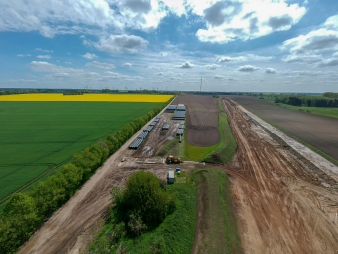On September 29, 2016, an Ohio appeals court found that propane and butane are considered “petroleum” and the construction and maintenance of a pipeline across private property to transport propane and butane is necessary and for a public use.
The case of Sunoco Pipeline, L.P. v. Teter, 2016-Ohio-7073, arose from a petition for appropriation and complaint for condemnation filed by Sunoco to obtain two permanent easements for a pipeline across a 162 acre farm in Jewett, Ohio. The farm is owned by Carol A. Teter, Trustee of the Carol A. Teter Revocable Living Trust. The pipeline is part of the “Mariner East 2 Pipeline” project which will transport propane and butane from facilities in Scio, Ohio about 350 miles to Sunoco’s Marcus Hook Industrial Complex in Pennsylvania and Delaware. The Harrison County Court of Common Pleas granted Sunoco’s request for appropriation and Teter appealed to Ohio’s Seventh District Court of Appeals.
Ohio Revised Code § 1723.01 allows a private company, which is organized for the purpose of transporting petroleum, to appropriate land in order to lay pipelines. Ohio Revised Code 163.021(A) requires that the government (or a corporation authorized by the government) seeking to appropriate property through eminent domain must prove that it is “necessary and for a public use.”
The Seventh District first considered whether or not propane and butane are “petroleum.” Ohio Revised Code § 1723.01 does not include a definition of petroleum. Teter retained an expert witness who testified that petroleum is a complex mixture of hydrocarbons and is a liquid at standard pressure. Pure propane and pure butane are not petroleum because they are not a mixture and they are gasses at standard pressure. Teter also argued that the Ohio legislature did not intend for the term petroleum to include products such as propane and butane back when the statute was enacted.
Sunoco argued that other parts of the Ohio Revised Code and the Ohio Administrative Code contain definitions of petroleum that include propane and butane and those definitions should be used in this case. Sunoco’s principal engineer testified in the trial court that in the oil and gas industry, any component of petroleum is considered petroleum.
The Seventh District agreed with Sunoco and found that “[a]lthough petroleum is not defined in R.C. 1723.01, other Ohio Revised and Administrative Code sections indicate pure propane and pure butane are considered petroleum. Furthermore, we conclude the word ‘petroleum’ has taken on a technical or industry definition, which includes pure propane and pure butane.”
The Seventh District also considered whether or not Sunoco’s proposed pipeline was necessary and for a public use. Teter argued that the propane and butane transported through the pipeline would be processed into plastics by Sunoco for use in commercial manufacturing or shipped overseas for similar processing. The pipeline does not have any “off ramps” in Ohio which, according to Teter, means that all of the products would be shipped and consumed outside of Ohio. As a result, she maintained that the pipeline was not necessary and was not for a public use.
Sunoco argued that the propane and butane would be used to heat homes and as an additive to gasoline to help automobiles start in the cold winter months. The products would also be used at “cracker” plants. Cracker plants process products like propane and butane to create petrochemicals that are used to make common household products, including plastics. Sunoco claimed that these products would come back to Ohio consumers. Sunoco also argued that without the pipeline, the Utica and Marcellus shale development and production would stagnate. For these reasons, Sunoco contended that the pipeline is necessary and for a public use.
The Seventh District agreed with Sunoco and found that “propane and butane are also used in the production of many products our society uses every day. Thus, the transportation of propane and butane provides more than economic benefit to Ohio, it provides some of the necessities of life.” The Seventh District affirmed the Harrison County Court of Common Pleas decision granting Sunoco’s request for appropriation.
Teter filed an appeal of the Seventh District’s decision with the Ohio Supreme Court on October 11, 2016. She requested that the court issue an order staying the execution of the Seventh District’s judgment while the appeal is pending. Sunoco opposed this request and asked that Teter be required to post a bond to cover Sunoco’s losses, which it estimated to be $9.5 million in losses and damages per week. The court granted the stay without requiring a bond be posted and the appeal remains pending.
Tagged In:Eminent DomainPetroleumPipeline


